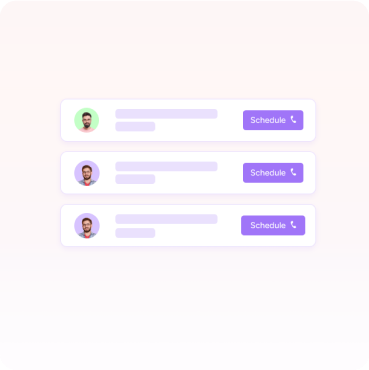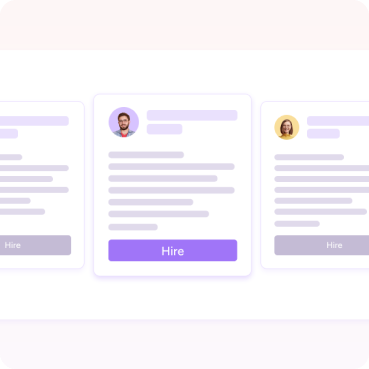Regular hiring
High RiskHire Azure developer of Silicon Valley caliber
Hire pre-vetted full time remote Azure developer from India. Hire now and build your dream engineering team with Hyno
Join 4,000+ companies already growing








Our Top Remote Developers
Hyno conducts rigorous testing and carefully vets the developers who are fueled by passion and skill sets. Hence, our developer community is the foundation for innovation and collaboration, bringing ideas and projects to fruition.
OUR STANDARDS
Hyno vs. Your regular recruitment process.
Find a risk-free, pre-interviewed, high-quality developer who is remote-ready in less than 2 weeks at 40% less cost.
Parameters
Choose the right for your firm.Time
Fees
Quality
Pre Screening
Remote readiness check
Termination
Failure rate
1 - 4 Months
> $1000
High
Low
Freelancing
High Risk1 - 2 Months
No fee
No
Very high
 Low Risk
Low Risk
0 - 15 Days
No fee
No
Very low
Pricing Starts from $35/hr
Accomplishing everything in just 3 steps
Our technical manager aligns the required skillset and tech stack with our talent pool to help you find the best fit.

Shortlisting candidates
Precise Hiring: Understanding, Gathering, and Shortlisting nittygritty.
-
 We start by thoroughly understanding your unique needs and specifications.
We start by thoroughly understanding your unique needs and specifications.
-
 check markWe
align the developer details with company goals. This way, we tailor the candidate
selection to seamlessly integrate with the organization’s vision and goals.
check markWe
align the developer details with company goals. This way, we tailor the candidate
selection to seamlessly integrate with the organization’s vision and goals.


Scheduling an Interview
Effortless talent selection: Finding your perfect match
-
 We connect you with the chosen candidates to ensure a personalized experience.
We connect you with the chosen candidates to ensure a personalized experience.
-
 Our rigorous
selection process guarantees that you find candidates who align seamlessly with your
requirements.
Our rigorous
selection process guarantees that you find candidates who align seamlessly with your
requirements.


Onboarding the talent
Streamlined onboarding for peak performance.
-
 The selected/qualified talent integrates smoothly through structured onboarding to
quickly adapt to projects, processes, and team dynamics.
The selected/qualified talent integrates smoothly through structured onboarding to
quickly adapt to projects, processes, and team dynamics.
-
 We go beyond
integration to offer ongoing support for a seamless transition to ensure that the
new talent exceeds your expectations.
We go beyond
integration to offer ongoing support for a seamless transition to ensure that the
new talent exceeds your expectations.


Read hiring guide
A one-stop shop to hiring the right Azure developer
How to hire a Azure developer? Skills to look for, interview questions, and more
Hiring a dedicated developer for your business can
be a cumbersome task. As many companies are competing to hire top Azure developer, so finding a good developer is not as easy as it may seem.
We're here to assist all employers who choose to hire Azure developer on their
own. Recruiting a developer on your own requires a fair amount of software
development experience in general. However, if you're a non-technical manager
interested in learning more about how to hire a Azure developer, we've put up
an excellent resource for you.
Things to check Key Skills Required for a Azure Developer?
The following are the key skills that a developer should possess to become proficient in Azure:
1. Proficiency in Azure services: The developer should have a solid understanding of the various Azure services, including Virtual Machines, Azure App Service, Azure Functions, Azure Storage, Azure SQL Database, Azure Cosmos DB, Azure Event Grid, Azure Event Hubs, Azure Service Bus, Azure Notification Hubs, and Azure Kubernetes Service.
2. Knowledge of programming languages: The developer should be proficient in programming languages such as C#, Java, Python, and JavaScript. They should also be familiar with frameworks such as .NET and Node.js.
3. Experience with DevOps: A good Azure developer should have experience with DevOps tools such as Azure DevOps, Jenkins, and Git. They should also be proficient in the Continuous Integration/Continuous Deployment (CI/CD) pipeline.
4. Understanding of security: The developer should have a solid understanding of Azure security features such as Azure AD, Azure Key Vault, and Azure Security Center. They should also be familiar with security best practices for developing and deploying applications on Azure.
5. Knowledge of Azure monitoring and logging: The developer should be proficient in Azure monitoring and logging tools such as Azure Monitor, Azure Log Analytics, and Azure Application Insights. They should also be able to set up and configure alerts and notifications.
6. Familiarity with Azure architecture: The developer should be familiar with Azure architecture patterns such as microservices architecture, serverless architecture, and event-driven architecture. They should also have experience designing and implementing scalable and fault-tolerant applications on Azure.
7. Excellent problem-solving skills: A good Azure developer should have excellent problem-solving skills and be able to troubleshoot issues quickly and efficiently. Overall, a good Azure developer should be experienced in developing and deploying cloud-based applications on Azure and have a solid understanding of Azure services, programming languages, DevOps, security, monitoring, logging, and architecture patterns.
Ideal Hiring Process for Azure Developer
1. Define the job description and qualifications: Clearly define the job description and qualifications required for the role. Be specific about the technical skills, experience, and knowledge required for the role. Also, consider adding soft skills such as good communication, teamwork, and time management skills.
2. Post the job: Post the job on job boards and social media platforms, and include a detailed description of the job responsibilities and qualifications. Also, be sure to mention that the role is remote and provide details on how the remote work will be managed.
3. Screen the resumes: Screen the resumes based on the qualifications and job requirements you defined. Look for candidates who have experience with Azure services, programming languages, DevOps, security, monitoring, logging, and architecture patterns.
4. Conduct phone or video interviews: Conduct phone or video interviews with the candidates who passed the initial screening. During the interview, ask questions related to their technical skills and experience. Also, ask about their communication skills, time management skills, and experience working remotely.
5. Conduct technical assessments: To assess the candidate's technical skills, consider conducting a technical assessment. This could be a coding test or a problem-solving exercise related to Azure services. Be sure to use a platform that can assess the candidate's skills and provide you with a report.
6. Check references: Before making a job offer, check the candidate's references to verify their work experience and skills. Ask for references from previous employers or clients who can speak to the candidate's technical and soft skills.
7. Make a job offer: Once you have found the ideal candidate, make a job offer that includes details about the job responsibilities, compensation, and remote work arrangements.
Important Interview questions to ask to Hire a Azure developer
What experience do you have working with Azure services?
The candidate should discuss their experience working with Azure services such as Virtual Machines, Azure SQL, Azure Active Directory, Azure Functions, etc. They should also provide examples of how they have used these services to solve real-world problems.
How do you secure applications and data in Azure?
The candidate should have a strong understanding of Azure security features such as Azure Security Center, Azure Key Vault, and Azure Active Directory. They should also be familiar with best practices for securing applications and data in Azure.
Can you explain the differences between Azure Service Fabric and Azure Kubernetes Service (AKS)?
The candidate should be able to discuss the differences between Azure Service Fabric and AKS, and when it might be appropriate to use one versus the other. They should also be able to explain how these services relate to containerization and microservices.
How do you troubleshoot performance issues in Azure applications?
The candidate should have experience using Azure tools such as Azure Monitor and Application Insights to troubleshoot performance issues. They should also be able to discuss common performance issues in Azure applications and how to address them.
How do you deploy and manage Azure resources using Infrastructure as Code (IaC)?
The candidate should be familiar with IaC tools such as Terraform and Azure Resource Manager (ARM) templates, and how to use them to deploy and manage Azure resources. They should also be able to discuss the benefits of using IaC and best practices for implementing it.
Can you discuss your experience with Azure DevOps?
The candidate should be able to discuss their experience using Azure DevOps for continuous integration and continuous deployment (CI/CD). They should also be familiar with other DevOps tools such as Git, Jenkins, and Ansible.
How do you integrate on-premises applications with Azure services?
The candidate should be able to discuss different integration options such as hybrid connections, Azure Service Bus, and Azure Logic Apps. They should also be able to discuss common integration scenarios and challenges.
Can you explain the differences between Azure Functions and Azure App Service?
The candidate should be able to discuss the differences between Azure Functions and Azure App Service, and when it might be appropriate to use one versus the other. They should also be able to explain how these services relate to serverless computing.
How do you ensure high availability and disaster recovery for Azure applications?
The candidate should be familiar with Azure features such as Availability Zones, Azure Site Recovery, and Azure Traffic Manager, and how to use them to ensure high availability and disaster recovery for Azure applications.
Can you discuss your experience working with Azure data services?
The candidate should be able to discuss their experience working with Azure data services such as Azure SQL, Azure Cosmos DB, and Azure Data Factory. They should also be able to discuss best practices for designing and implementing scalable and secure data solutions in Azure.
Job Description Template for Azure developer
Location: [Insert Location]
Job Title: Azure Developer
Position Type: Full-Time
Salary: [Insert Salary Range]
We are seeking an experienced Azure Developer to join our team. The successful candidate will be responsible for designing, developing, and maintaining applications and services that run on Microsoft Azure. The ideal candidate should have a strong background in Azure development, with experience in developing and deploying scalable, secure, and reliable solutions in Azure.
Key Responsibilities:
- Design, develop, and maintain Azure-based applications and services
- Develop and implement scalable and secure solutions on Azure
- Collaborate with cross-functional teams to design and implement solutions
- Implement best practices for Azure development and deployment
- Troubleshoot and debug Azure-based applications and services
- Participate in code reviews and provide feedback to other developers
- Continuously learn and keep up-to-date with the latest Azure technologies and features
Requirements:
- Bachelor's degree in Computer Science or a related field
- Minimum of 3 years of experience in Azure development
- Strong knowledge of Azure services, including Virtual Machines, Azure SQL, Azure Active Directory, Azure Functions, and Azure App Service
- Experience with Azure DevOps and CI/CD pipelines
- Experience with IaC tools such as Terraform and Azure Resource Manager (ARM) templates
- Strong understanding of security and compliance in Azure
- Experience with data services such as Azure SQL, Azure Cosmos DB, and Azure Data Factory
- Experience with containerization and microservices using Azure Service Fabric and Azure Kubernetes Service (AKS)
- Strong analytical and problem-solving skills
- Excellent communication and teamwork skills
Preferred Qualifications:
- Microsoft Azure certification, such as Azure Developer Associate or Azure Solutions Architect Expert
- Experience with other cloud platforms such as AWS or Google Cloud
- Experience with .NET or other programming languages
If you are an experienced Azure Developer who enjoys working in a fast-paced, challenging environment, we would love to hear from you. Please submit your resume and cover letter for consideration.